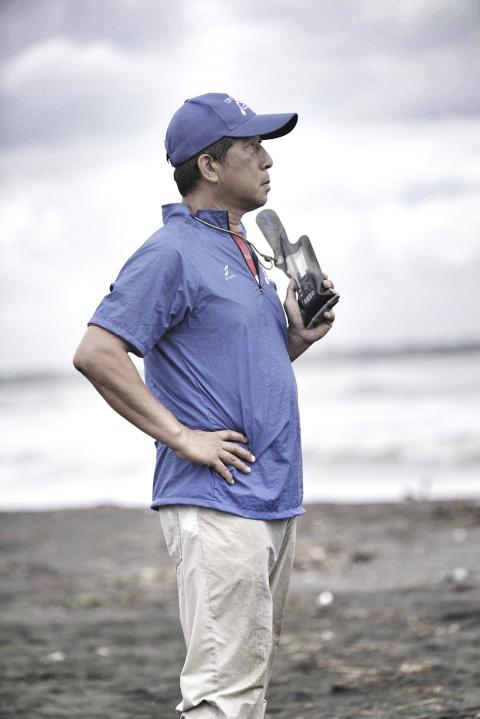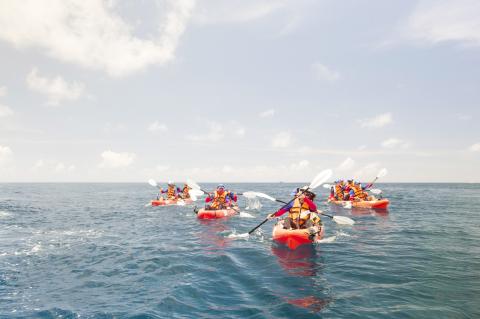Following a determined explorer and his 16 proteges, driven by a dream deemed crazy by others, Dream Ocean (夢想海洋) is one of those documentaries made to appeal to a general audience. After all, what is there not to like about a group of individuals striving to achieve the impossible? The premise has the necessary elements for a story that promises plenty of drama and passion.
But what makes the documentary genuine and heartfelt is its protagonist Su Tar-zen (蘇達貞), a 63-year-old oceanographer devoted to promoting Taiwan’s ocean literacy, or the understanding of human influence on the ocean and vice versa.
The film opens with Su carefully examining the design of a canoe on his porch by the sea in Hualien. It is part of the grand plan the retired professor initiated last year, along with 16 selected young men and women from around the country. The goal: to voyage around the world in a canoe.

Photo courtesy of Hualien Media
The seafarers’ first mission will entail paddling from Hualien to Okinawa to Hawaii and finally, San Francisco.
For the next 90 minutes, the film follows the group of adventurers as they train in open water and learn to build their own vessels by hand. These “marine backpackers” can’t afford fancy stuff. They experiment, conserve and try to use as little resources as possible to make the canoe.
In the eyes of others, their endeavor is nothing short of dangerous. One sailcloth merchant, for example, stares at the young mariners in disbelief after realizing what they plan to do and says, “You’d better buy a lot of insurance. I have absolutely no faith in my products.”

Photo courtesy of Hualien Media
For the most part, director Wang Wei-hsiang (王威翔) keeps the story buoyant and brisk, but social criticism occasionally seeps in. One such moment occurs when a crew member complains about how the water is “polluted and oily” after they paddle along the shore of Mailiao (麥寮) in Yunlin County, where the sixth naphtha cracker (六輕) plant looms.
The film hits its most poignant and emotional note when the audience discovers the reason why Su dedicates all his time, efforts and lifelong savings to found and manage the Jonathan Su Foundation (蘇帆海洋文化藝術基金會), which aims to cultivate a better understanding of the ocean and promote marine conservation, while encouraging ocean canoeing in particular.
In 2007, the oceanographer’s son, Jonathan, died in a diving accident. Before the accident, the father promised his son, also a marine enthusiast, that they would canoe around Taiwan together.
Su is keeping his promise.

May 11 to May 18 The original Taichung Railway Station was long thought to have been completely razed. Opening on May 15, 1905, the one-story wooden structure soon outgrew its purpose and was replaced in 1917 by a grandiose, Western-style station. During construction on the third-generation station in 2017, workers discovered the service pit for the original station’s locomotive depot. A year later, a small wooden building on site was determined by historians to be the first stationmaster’s office, built around 1908. With these findings, the Taichung Railway Station Cultural Park now boasts that it has

The latest Formosa poll released at the end of last month shows confidence in President William Lai (賴清德) plunged 8.1 percent, while satisfaction with the Lai administration fared worse with a drop of 8.5 percent. Those lacking confidence in Lai jumped by 6 percent and dissatisfaction in his administration spiked up 6.7 percent. Confidence in Lai is still strong at 48.6 percent, compared to 43 percent lacking confidence — but this is his worst result overall since he took office. For the first time, dissatisfaction with his administration surpassed satisfaction, 47.3 to 47.1 percent. Though statistically a tie, for most

As Donald Trump’s executive order in March led to the shuttering of Voice of America (VOA) — the global broadcaster whose roots date back to the fight against Nazi propaganda — he quickly attracted support from figures not used to aligning themselves with any US administration. Trump had ordered the US Agency for Global Media, the federal agency that funds VOA and other groups promoting independent journalism overseas, to be “eliminated to the maximum extent consistent with applicable law.” The decision suddenly halted programming in 49 languages to more than 425 million people. In Moscow, Margarita Simonyan, the hardline editor-in-chief of the

Six weeks before I embarked on a research mission in Kyoto, I was sitting alone at a bar counter in Melbourne. Next to me, a woman was bragging loudly to a friend: She, too, was heading to Kyoto, I quickly discerned. Except her trip was in four months. And she’d just pulled an all-nighter booking restaurant reservations. As I snooped on the conversation, I broke out in a sweat, panicking because I’d yet to secure a single table. Then I remembered: Eating well in Japan is absolutely not something to lose sleep over. It’s true that the best-known institutions book up faster